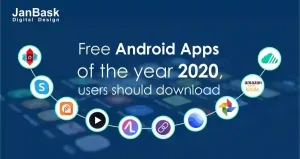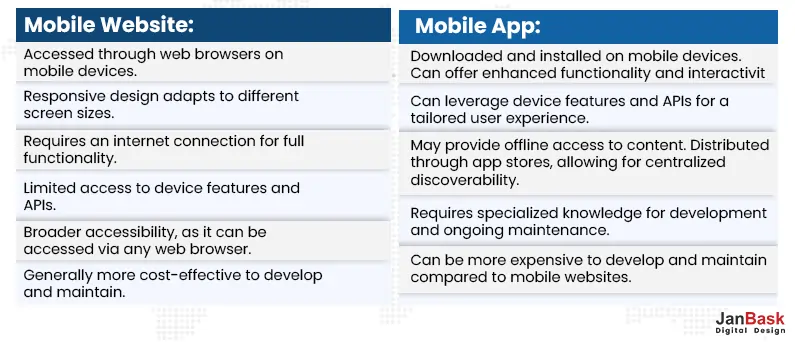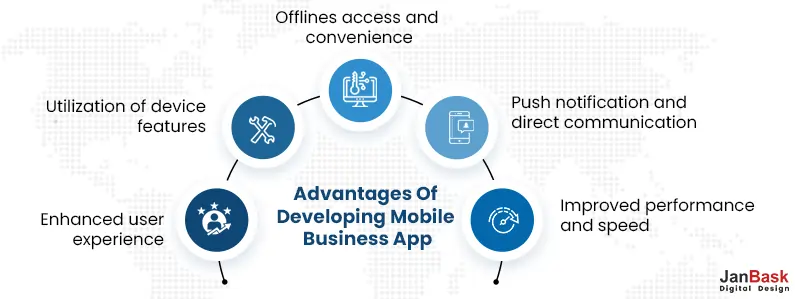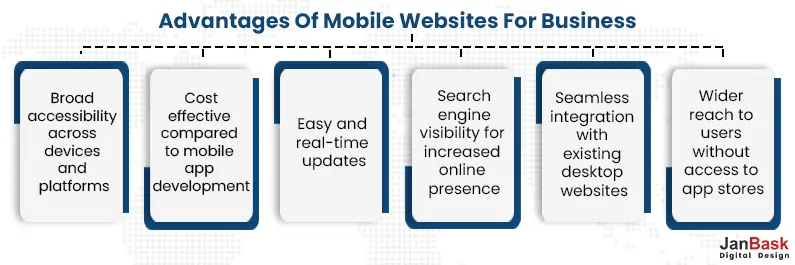
Are you torn between developing a mobile app vs a website for your business? In today's digital era, where mobile devices dominate the market, it's crucial to establish a strong mobile presence. But which option is the better choice? Should you invest in a mobile website or go for a dedicated app? The debate of mobile website vs app has been ongoing, and making the right decision requires careful consideration.
In this article, we will delve into the comparison of mobile website vs app development, examining the pros and cons of each to determine which emerges as the better choice. So, whether you are pondering the merits of an app vs website or exploring the dynamics of an app or website, or looking for a stellar mobile app development company, read on to make an informed decision that aligns with your business goals.

Looking for Mobile App Development Services?
When it comes to mobile presence, understanding the difference between a mobile website and an app is crucial. Let's delve into the comparison of app vs website, exploring the differences and benefits of each.
In the case of apps vs websites, it's important to note that they serve different purposes and offer distinct user experiences. A mobile app refers to a standalone application that users download and install on their devices, while a mobile website is a responsive version of a website specifically designed for optimal viewing on mobile devices.
Here is a breakdown of the differences of mobile app vs mobile website based on their functionality, user experience and accessibility.

In conclusion, the decision between mobile apps vs. mobile websites depends on various factors such as functionality requirements, target audience, budget, and development expertise. While mobile apps offer enhanced functionality and a personalized experience, mobile websites provide broader accessibility and cost-effectiveness. Understanding the nuances of apps and websites empowers businesses to make informed choices for their mobile presence strategy.
If you look around, businesses, especially online businesses, are constantly seeking innovative ways to connect with their customers and provide exceptional experiences. One avenue that has gained significant popularity is developing a mobile business app. Mobile apps offer unique advantages over websites, enabling businesses to engage with their audience more effectively and increase organic traffic. In this section, we will explore the advantages of developing a mobile business app and why it can be a game-changer for your organization.

Mobile apps provide a highly interactive and personalized user experience. With an app, businesses can tailor the interface, content, and functionalities to match the preferences and behaviors of their target audience. This level of customization enhances user engagement and satisfaction, fostering long-term relationships with customers and brand awareness.
One of the key advantages of mobile apps is their ability to leverage the native features of mobile devices. Apps can tap into device functionalities like camera, GPS, accelerometer, and push notifications, enabling businesses to deliver rich and immersive experiences. For instance, a retail app can use the camera to implement augmented reality features for virtual try-ons, enhancing the shopping experience.
Unlike websites, mobile apps can offer certain functionalities and content even when users are offline. This offline accessibility allows users to access crucial information, perform tasks, and utilize app features without requiring a constant internet connection. For businesses in sectors like travel or e-commerce, this feature ensures uninterrupted access and convenience for users, leading to increased engagement and loyalty.
Mobile apps enable direct and instant communication with users through push notifications. Businesses can send personalized messages, updates, promotions, and relevant information directly to the user's device, increasing engagement and driving conversions. Push notifications serve as a powerful tool for customer re-engagement, reminding users about new features, discounts, or abandoned carts, thereby boosting customer retention and sales.
Mobile apps are designed to deliver optimal performance, providing faster loading times and smoother user interactions compared to websites. Apps are built specifically for mobile platforms, allowing for efficient utilization of device resources and optimized rendering. This enhanced performance translates into a seamless and enjoyable user experience, keeping users engaged and satisfied.
Developing mobile apps with great user flexibility can undoubtedly offer numerous advantages, elevating your brand's presence and customer engagement.
By leveraging the advantages of mobile apps, businesses can create a competitive edge, deepen customer relationships, drive sales, and improve overall brand loyalty. So, whether you are in the retail industry, hospitality sector or any other business vertical, exploring the potential of a mobile business app can unlock new opportunities for growth and success.
Mobile devices have become an integral part of our lives and so it has become a need for businesses to adapt and optimize their online presence for mobile users. While mobile apps offer unique advantages, mobile websites play a crucial role in reaching and engaging a wider audience. In this section, we will particularly explore the benefits of mobile websites for businesses and why they are an essential component of a successful digital marketing strategy.

One of the primary advantages of mobile websites is their accessibility across various devices and platforms. Unlike mobile apps, which require users to download and install them, mobile websites can be accessed directly through web browsers. This broad accessibility ensures that businesses can reach a wider audience, regardless of the device or operating system they are using. It eliminates barriers to entry and allows businesses to connect with users seamlessly.
Developing a mobile website is often more cost-effective than creating a mobile app. Mobile app development involves intricate coding, multiple platform adaptations, and ongoing maintenance. In contrast, mobile websites leverage responsive design techniques, which enable them to adapt to different screen sizes and resolutions. This approach reduces development and website maintenance costs significantly while still delivering a user-friendly experience across devices.
Mobile websites play a crucial role in improving a business's search engine visibility. With the increasing use of mobile devices for online searches, search engines prioritize mobile-friendly websites in their search results. By optimizing your website for mobile devices, you enhance its chances of ranking higher in search engine results pages (SERPs). This increased visibility drives organic traffic to your website and boosts your brand's online presence.
Mobile websites offer the advantage of seamless updates and maintenance. With a mobile app, any changes or updates require users to download and install the updated version. In contrast, mobile websites can be updated in real-time, with the changes reflecting immediately for users. This flexibility allows businesses to make quick updates, add new content, or introduce new features without disrupting the user experience or requiring additional user actions.
Mobile websites are designed to provide an optimal user experience on mobile devices. Responsive design techniques ensure that the website layout, content, and functionality adapt seamlessly to different screen sizes and resolutions. This responsiveness enhances user experience, making navigation and content consumption intuitive and user-friendly. A positive user experience on a mobile website leads to increased engagement, longer visit durations, and increased conversion rates for small business websites.
In conclusion, while mobile apps offer unique advantages, mobile websites are an indispensable component of a comprehensive digital strategy. Mobile websites provide broad accessibility, cost-effectiveness, improved search engine visibility, seamless updates, and an enhanced user experience. By investing in mobile website development and optimization, businesses can effectively reach and engage their mobile audience, drive traffic and boost their online presence.
If you are considering expanding your mobile presence, Janbask's mobile app development services can help you create a comprehensive mobile strategy. Our expert team will assist you in developing a mobile website or a mobile app tailored to your business needs, ensuring that you effectively connect with your target audience in the mobile landscape.
As the digital world expands, businesses are faced with the question of whether to invest in a mobile app or a website. While both options have distinct advantages, it ultimately depends on the goals and needs of the business. Mobile apps can offer a personalized experience for users and make it easier for them to access your business from their handheld devices. On the other hand, websites are typically more cost-effective and easier to maintain and update.
You know why are websites so important for businesses. Since, a website is great for providing general information about your business, allowing potential customers to learn about your products or services, and providing a platform to showcase your company’s mission and vision.
On the other hand, an app is ideal for businesses looking to provide customers with a more personalized and interactive experience, with features such as push notifications, real-time updates, and notifications. Ultimately, the decision of whether to go the app or website route will depend on your business needs, budget, and target audience.
It's important to consider factors such as your target audience, budget, and desired functionality when making this decision. Ultimately, the right choice will depend on the unique needs of your business and what will best serve your customers.
1. What is the main difference between a mobile website and an app?
The main difference between mobile app vs website lies in their functionality and accessibility. A mobile website is accessed through a web browser and can be accessed by any device with internet connectivity. On the other hand, an app is a standalone application that needs to be downloaded and installed on a user's device. Apps can leverage device features and offer a more immersive and interactive user experience.
2. Which is better, a mobile website or an app?
The choice between a mobile app vs a website depends on various factors, such as the nature of your business, target audience, and specific goals. Mobile websites are ideal for reaching a broader audience, as they are accessible across devices and platforms. They are also more cost-effective to develop and maintain. Apps, on the other hand, provide a more personalized and interactive user experience, leveraging device capabilities. The decision ultimately boils down to your business objectives and the preferences of your target audience.
3. Can I have both a mobile website and an app?
Absolutely! In fact, many businesses opt for a combination of a mobile website and an app to cater to different user preferences and needs. A mobile website ensures broad accessibility, allowing users to access your content from any device with an internet connection. An app provides a more tailored and engaging experience, leveraging features like push notifications and offline access. By offering both options, you can maximize your reach and provide a seamless user experience across different platforms.
4. What are the advantages of hiring a mobile app development company for app development?
Hiring a professional mobile app development company brings several advantages. These companies have a team of experienced developers who possess the technical expertise and industry knowledge to build high-quality apps. They follow best practices in design, coding, and testing, ensuring that your app is functional, secure, and user-friendly. Additionally, mobile app development companies provide ongoing support and website maintenance services, keeping your app up to date and addressing any issues that may arise.
5. Can I develop an app without hiring a mobile app development company?
Yes, it is possible to develop an app without hiring a mobile app development company. There are app development tools and platforms available that allow individuals or businesses with limited technical knowledge to create basic apps. These app creation tools often provide templates and drag-and-drop interfaces for building apps. However, it's important to note that these DIY app development approaches may have limitations in terms of customization, scalability, and overall quality. For more complex and feature-rich apps, hiring a professional app development company is recommended.
In the ongoing debate of mobile website vs. app, it's crucial for businesses to carefully consider their goals, target audience, and budget to determine the better choice for their specific needs. Both mobile website vs app have their own advantages and serve different purposes in the digital landscape. While mobile websites offer broad accessibility and cost-effectiveness, apps provide enhanced user experience and utilization of device features.
At Janbask, we understand the importance of a strong mobile presence for businesses. As a leading mobile app development company and mobile website design agency, we offer comprehensive solutions to help businesses make the right choice and maximize their digital potential. Our expert team specializes in mobile web design services, ensuring that your mobile website is responsive, user-friendly, and optimized for various devices and screen sizes. We work closely with you to understand your business objectives and target audience, creating a mobile website that reflects your brand identity and engages users effectively.
Moreover, if you decide that building an app is the better choice for your business, our skilled app developers are here to assist you. As a mobile website design company, we have the expertise and experience to build custom apps for iOS, Android, and cross-platform environments. From conceptualization to design, coding, testing, and deployment, we guide you through the entire app development process, ensuring a seamless and high-quality result. Whether you choose a mobile website or an app, Janbask is committed to providing tailored solutions that align with your business objectives. We help businesses leverage the power of mobile technology to reach their target audience, drive engagement, and achieve digital success.
Interested in our Web Design & Development Services?

J
I appreciate how this blog concisely breaks down the differences between mobile websites and apps.
F
I found this blog’s comparison of mobile websites and apps to be straightforward and informative.
C
This is a well written blog article on mobile websites and apps.
R
I’m impressed by this blog’s ability to present a concise and easy-to-understand comparison between mobile websites and apps.